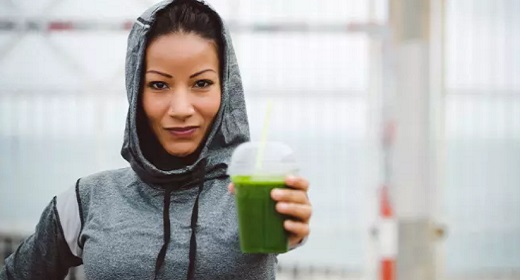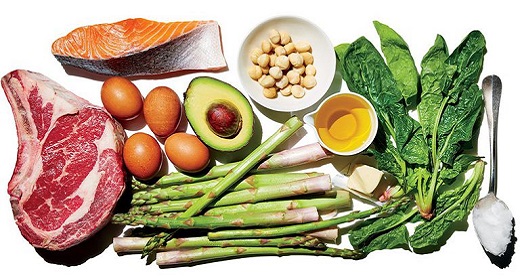by Elizabeth Marglin: A yoga teacher’s job description often requires them to be in constant motion on a daily basis. Here, 5 teachers fill us in on the supplements that keep them feeling great, even on their busiest days…

We all know that a moderate, whole foods plant-based diet is the way to go in terms of ideal nutrition. But there are holes in even the most meticulous diets that could use rounding out. Yoga teachers—whose jobs practically require radiant health, not to mention the stamina to be in constant motion on a daily basis—use supplements as the secret ingredient to top off their presumably already-decent diet. Take a tip from these top teachers and try these five supplements for a little extra zing in your sun salute.
1. Chlorella/Spirulina
Recommended by: Tias Little
Rich in iron, protein, GLA (gamma linolenic acid, part of the omega family) and B-12, a chlorella/spirulina combo has earned a glittering reputation for boosting your immune system and aiding in detoxification.
“The optimal supplement for me includes chlorella/spirulina,” says Santa Fe, New Mexico-based Tias Little, founder of Prajna Yoga. “I take it in powder-form first thing in the morning an hour prior to my yoga practice. I drink it mixed with 16-ounces of water and a shot of stevia. Oftentimes, I mix it with Maca Root”
“I find that the concoction brings wakefulness to my tissues,” says Little. “Not only is it hydrating, but I feel light and clear. In my practice, the root powder enables me to move mindfully and carefully. The spirulina brings a fluid and buoyant quality to my tissues. It supports my circulatory rhythms of blood, lymph and extra-cellular fluid. So the combination of grounding (via the Maca Root) and levity (via the spirulina) provides balanced support to me in my practice.”
A little-known fact about spirulina: NASA and The European Space Agency have undertaken research to quantify its benefit as a dietary supplement for astronauts on space missions.
And chlorella’s claim to fame is that it’s one of the few plant sources with vitamin B-12. A 2015 study published in the Journal of Medicinal Food found that chlorella helped to improve the health-markers of vegans and vegetarians study participants with a history of B-12 deficiency.
2. Ashwagandha
Recommended by: Sarah Finger
Ashwagandha, one of the most popular Ayurvedic herbs and sometimes called Indian ginseng, has been prized for millennia for its ability to reduce inflammation. That super power is attributed to its high concentration of withanolides, naturally occurring steroids that combat stress and boost strength.
“I am not big on taking too many daily supplements because I really believe in our body’s intelligence to create and ward off what it needs to maintain homeostasis,” says New York City-based Sarah Finger, co-founder of ISHTA Yoga. “However, I take Ashwagandha without fail. It is considered an ‘adaptogen’ in that it helps the body to cope with daily stress.
“Living in a very busy city like New York City takes a toll on the nervous system, and I have found that by taking Ashwaganda, my focus is better and I am especially feeling positive effects in my yoga and meditation practice,” says Finger. “I am more able to slow down my breath and sit for a more extended period of time without distraction.”
An added bonus of Ashwagandha is that it not only decreases stress, but food cravings. A 2016 study published in the Journal of Evidence-based Complementary & Alternative Medicine found that a daily Ashwagandha supplement helped participants manage food cravings better.
3. Turmeric
Recommended by: Gina Caputo
You know when Starbucks gets in on something, it’s a thing. Since 2017, Starbucks has rolled out turmeric lattes in their UK locations. But long before the advent of golden lattes, turmeric has been considered a godsend for a range of conditions, including arthritis and high cholesterol.
A 2012 pilot study published in Phytotherapy Research found that turmeric reduced joint pain for participants with rheumatoid arthritis better than a non-steroidal anti-inflammatory drug, NSAID.
“I take a turmeric tincture daily,” says Boulder, Colorado-based Gina Caputo, founder of the Colorado School of Yoga. “Turmeric is a root, that is a relative to ginger, and its active compound, curcumin, has shown to have rather powerful anti-inflammation properties. Some studies have shown that also helps boost antioxidant-capacity and helps to fight free-radical damage.”
Caputo prefers a tincture, as opposed to taking it as a powder or capsule. “It’s easier to bring with me when I travel and I digest it more efficiently since it begins in your mouth itself via your mucus membranes,” says Caputo. “Also, apparently turmeric is more stable in an alcohol base. I have noticed consistently good gut-health as well as consistently painless joint mobility. I attribute this to good hydration, balanced diet, regular and diverse movement practices and a little help from this amazing Ayurvedic herb.”
4. DIM
Recommended by: MaryBeth LaRue
Diindolylmethane, or DIM, is possibly the best supplement you’ve never heard of. According to the DIM Resource Center at the University of California at Berkeley, DIM can powerfully boost your immune system. A bioactive compound derived from cruciferous vegetables like broccoli, cauliflower and cabbage, shows promise as a chemoprotective compound for breast cancer and prostate cancer—although more research is needed.
For LA-based yoga teacher Marybeth LaRue, co-founder of Rock Your Bliss, a daily dose of DIM is an indispensable part of her ability to self-regulate and find an even keel.
“I take milk thistle and DIM daily as a way to balance my hormones,” says LaRue. “DIM has been especially influential for me as it has gotten rid of my brain fog entirely (often caused by hormone imbalance), keeping my skin clear, regulated my periods, kept my endometriosis cramps at bay and majorly reduced any PMS symptoms. I know for myself that no amount of meditation, asana or positive talk helps if my body is feeling wildly imbalanced.”
5. Protein and Greens
Recommended by: Tiffany Cruikshank
When it comes to protein powders, increasing research suggests that a blend of pea and rice protein powder can provide optimal levels of B vitamins. Both pea and rice protein contain no dairy or gluten, and are amongst the most hypoallergenic protein sources on the market.
Seattle, Washington-based Tiffany Cruikshank, founder of Yoga Medicine, swears by a combo of protein and greens powder. It gives her an extra boost her body needs before embarking on her morning practice.
“This combo does just the trick for me—not too heavy, but keeps my blood sugar steady through even a longer practice,” says Cruikshank.
“I’m a huge supplement fan,” says Cruikshank. “I’ve used many different supplements to support my health over the years for many different things.”
“The products I’ve used the longest and most regularly is a combo I mix together with MediClear Plus by Thorne and Vitality Super Greens by Body Ecology,” says Cruikshank. “It’s my magical travel potion. I’ve used this for the past 12 years to support my energy levels while traveling. I attribute a lot of my health on the road to this mix.”
“The MediClear protein powder supports my blood sugar, mood, energy and helps support liver detox pathways to clean out toxins I may be taking in while traveling.”
“The Body Ecology Vitality Super Greens starts my day off with greens and good nutrition and I love that it includes adaptogens, fermented algae and veggies.”

















































